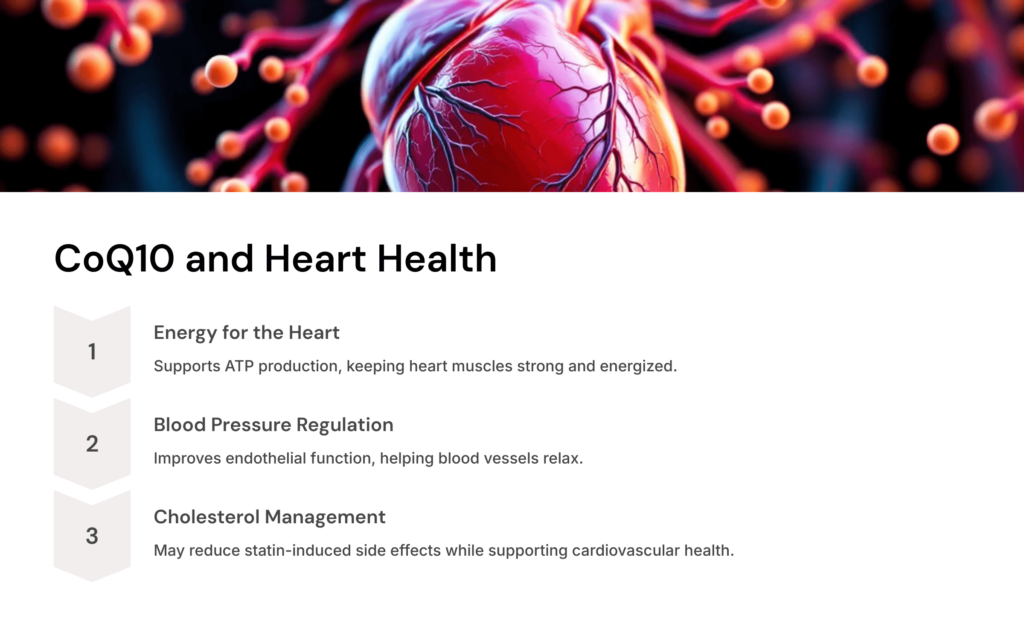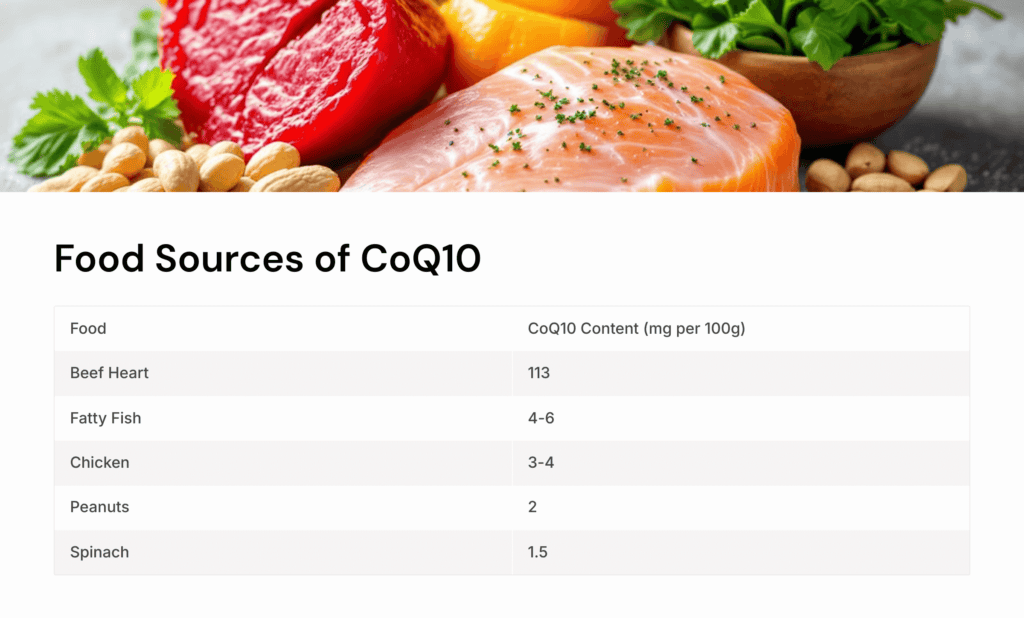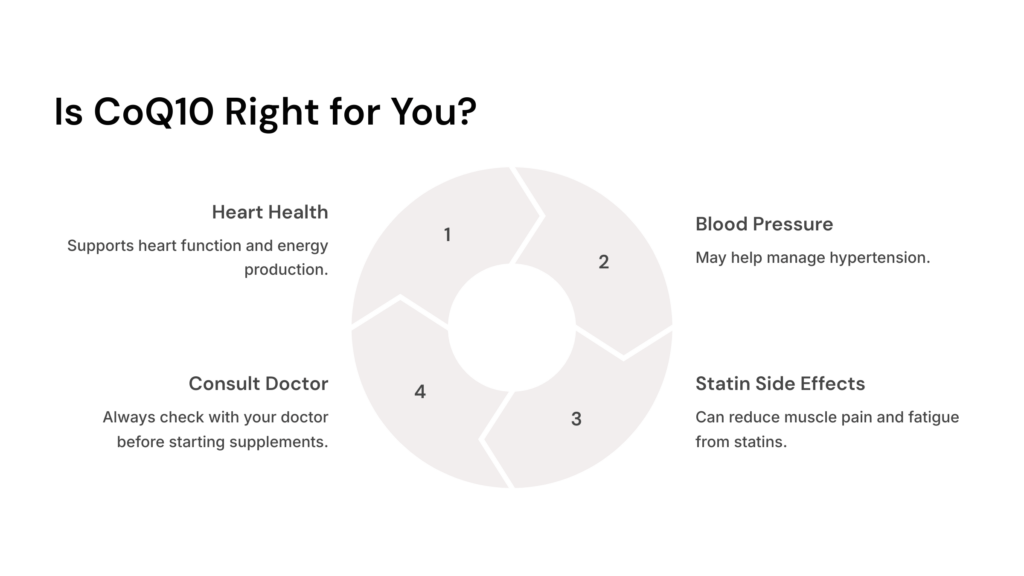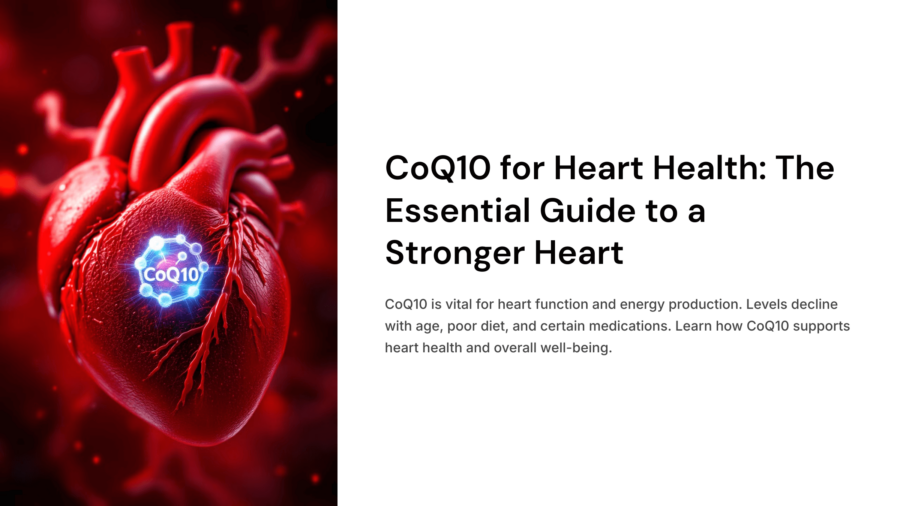CoQ10 for Heart Health: The Essential Guide to a Stronger Heart
Are you constantly feeling low on energy, even after a full night’s rest? Your heart might be craving CoQ10. This essential nutrient plays a vital role in heart function, energy production, and overall well-being.
📋 Contents
Why Your Heart Needs CoQ10
Your heart is the hardest-working muscle in your body, beating over 100,000 times a day. But did you know that every beat requires energy? That’s where Coenzyme Q10 (CoQ10) comes in.
CoQ10 is a natural antioxidant found in your body’s cells, essential for energy production and heart function. However, levels decline with age, poor diet, and certain medications like statins, potentially putting your heart at risk.
If you’ve been struggling with fatigue, high blood pressure, or cholesterol issues, CoQ10 might be the missing link to better heart health.
💡 TIP: Research shows that CoQ10 supplementation can improve heart function in people with heart failure and reduce the risk of heart disease.
In this guide, we’ll explore how CoQ10 supports your heart, where to find it in food, whether you need a supplement, and what science has to say about its benefits.
❤️ What is CoQ10?
Understanding This Powerful Antioxidant
Coenzyme Q10 (CoQ10) is a naturally occurring compound in your body that plays a vital role in energy production and cellular function. It’s found in nearly every cell, but is especially concentrated in the heart, liver, and kidneys.
How CoQ10 Works in the Body
CoQ10 is primarily involved in the production of ATP (adenosine triphosphate), the energy currency of your cells. Without adequate levels, your heart and other organs may struggle to function optimally.
💎 Key Point:
CoQ10 is both an energy booster and a powerful antioxidant, protecting cells from oxidative stress and aging.
Why Do CoQ10 Levels Decline?
Several factors can lead to a drop in CoQ10 levels, including:
- ✅ Aging: CoQ10 production decreases naturally with age.
- ✅ Medications: Statins, used for lowering cholesterol, significantly reduce CoQ10 levels.
- ✅ Poor diet: A diet low in CoQ10-rich foods may contribute to deficiencies.
- ✅ Chronic diseases: Conditions like heart disease, diabetes, and cancer are associated with lower CoQ10 levels.
🩺 How Does CoQ10 Support Heart Health?

CoQ10 and Energy Production in the Heart
Your heart requires massive amounts of energy to pump blood efficiently. CoQ10 supports heart function by aiding in the production of ATP, ensuring that your heart muscles stay strong and energized.
CoQ10 and Blood Pressure Regulation
Studies suggest that CoQ10 may help lower high blood pressure. It works by improving endothelial function, helping blood vessels relax and reducing strain on the heart.
💡 TIP: A meta-analysis found that CoQ10 supplementation can reduce systolic blood pressure by up to 17 mmHg!
CoQ10 and Cholesterol Management
Statin medications, commonly prescribed for high cholesterol, can deplete CoQ10 levels. This can lead to muscle pain, fatigue, and even heart complications. Supplementing with CoQ10 may reduce statin-induced side effects while supporting overall cardiovascular health.
🍊 Best Food Sources of CoQ10

Top CoQ10-Rich Foods
Although your body produces CoQ10, you can boost levels through diet. Here are some of the best food sources:
| Food | CoQ10 Content (mg per 100g) |
|---|---|
| Beef Heart | 113 mg |
| Fatty Fish (Salmon, Mackerel) | 4–6 mg |
| Chicken | 3–4 mg |
| Peanuts | 2 mg |
| Spinach | 1.5 mg |
Can You Get Enough from Food Alone?
While consuming CoQ10-rich foods is beneficial, dietary intake alone may not be enough—especially for individuals on statins, older adults, or those with heart disease.
⚠️ WARNING: Cooking methods can reduce CoQ10 content in foods. Avoid overcooking meats and opt for steaming or grilling instead.
💊 Should You Take a CoQ10 Supplement?
Who Might Benefit from CoQ10 Supplements?
While CoQ10 is found in food, some individuals may need additional supplementation. You might consider taking a CoQ10 supplement if you:
- ✅ Take statins: These cholesterol-lowering drugs reduce CoQ10 levels.
- ✅ Have heart disease: CoQ10 may help improve heart function and reduce complications.
- ✅ Experience fatigue or muscle weakness: Low CoQ10 levels can impact energy production.
- ✅ Are over 40: Natural CoQ10 production declines with age.
Choosing the Right CoQ10 Supplement
When selecting a CoQ10 supplement, look for:
| Form | Absorption Rate |
|---|---|
| Ubiquinone | Standard form, lower absorption |
| Ubiquinol | More bioavailable, better for older adults |
| CoQ10 with Omega-3 | Enhanced absorption |
Optimal Dosage and Safety
For heart health, the recommended daily dosage typically falls between 100–300 mg. Higher doses may be required for individuals with heart conditions.
💡 TIP: CoQ10 is fat-soluble—take it with a meal containing healthy fats for better absorption!
While generally safe, CoQ10 supplements may interact with blood thinners and blood pressure medications. Always consult your doctor before starting supplementation.
🔬 Scientific Studies on CoQ10 and Heart Health
CoQ10 and Heart Failure
One of the most well-documented benefits of CoQ10 is its role in heart failure management. A groundbreaking study, the Q-SYMBIO trial, found that CoQ10 supplementation reduced major cardiovascular events by 42% in heart failure patients.
CoQ10 and Blood Pressure
A meta-analysis of 12 clinical trials showed that CoQ10 can lower systolic blood pressure by 11–17 mmHg in hypertensive patients.
CoQ10 and Cholesterol Reduction
Research suggests that CoQ10 may help manage cholesterol levels by reducing oxidative stress and preventing LDL cholesterol from oxidizing.
💎 Key Point:
CoQ10 is backed by science for its ability to improve heart health, reduce blood pressure, and lower the risk of cardiovascular disease.
With numerous studies supporting its benefits, CoQ10 is a valuable nutrient for anyone looking to improve heart health naturally.
❓ FAQ About CoQ10 for Heart Health
How does CoQ10 help the heart?
CoQ10 plays a crucial role in energy production and acts as a powerful antioxidant. It helps maintain heart function, lowers blood pressure, and protects against oxidative stress.
Can CoQ10 lower blood pressure?
Yes! Studies show that CoQ10 can reduce systolic blood pressure by up to 17 mmHg, making it beneficial for those with hypertension.
What is the best form of CoQ10 to take?
Ubiquinol is the most bioavailable form, meaning your body absorbs it more efficiently than ubiquinone. It’s recommended for older adults or those with heart conditions.
Can I get enough CoQ10 from food?
While some foods like beef heart and fatty fish contain CoQ10, diet alone may not provide enough, especially if you take statins or have a heart condition.
Do statins deplete CoQ10?
Yes, statins reduce CoQ10 levels, which can lead to muscle pain and fatigue. Supplementing with CoQ10 may help counteract these effects.
How much CoQ10 should I take daily?
The recommended dose for heart health ranges from 100–300 mg per day. Consult your doctor for personalized advice.
Are there any side effects of CoQ10?
CoQ10 is generally safe, but some people may experience mild side effects like nausea, upset stomach, or headaches. Taking it with food can help minimize these effects.
💖 Final Thoughts: Is CoQ10 Right for You?

CoQ10 is a powerhouse nutrient that plays a key role in heart health, energy production, and overall well-being. Whether you’re looking to support your heart, manage blood pressure, or reduce the side effects of statins, CoQ10 is a natural and science-backed solution.
💡 TIP: For maximum benefits, choose ubiquinol over ubiquinone and take your supplement with a meal containing healthy fats!
If you suspect your CoQ10 levels are low, adding more CoQ10-rich foods to your diet or considering supplementation may be a smart move. Always consult with your doctor before starting any new supplement, especially if you have a medical condition or take prescription medications.
Ready to give your heart the support it deserves? Start incorporating more CoQ10 into your routine today! 💙


1 thought on “CoQ10 for Heart Health: The Essential Guide to a Stronger Heart”